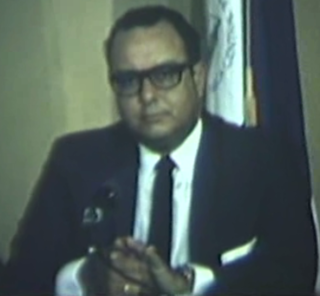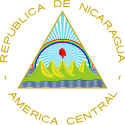
Anastasio "Tachito" Somoza Debayle was the President of Nicaragua from 1 May 1967 to 1 May 1972 and from 1 December 1974 to 17 July 1979. As head of the National Guard, he was de facto ruler of the country between 1972 and 1974, even during the period when he was not the de jure ruler.

Legislative elections were held in El Salvador on 8 March 1970. The result was a victory for the National Conciliation Party, which won 34 of the 52 seats. However, the election was marred by massive fraud. Voter turnout was just 41.6%.
Sandinista ideology or Sandinismo is a series of political and economic philosophies instituted by the Nicaraguan Sandinista National Liberation Front throughout the late twentieth century. The ideology and movement acquired its name, image and most crucially, its military style from Augusto César Sandino, a Nicaraguan revolutionary leader who waged a guerrilla war against the United States Marines and the conservative Somoza National Guards in the early twentieth century. Despite using the Sandino name, the principals of modern Sandinista ideology were mainly developed by Carlos Fonseca, inspired by the leaders of the Cuban Revolution in the 1950s, sought to inspire socialist populism among Nicaragua's peasant population. One of these main philosophies involved the institution of an educational system that would "free" the population from the perceived historical fallacies spouted by the ruling Somoza family. By awakening political thought among the people, proponents of Sandinista ideology believed that human resources would be available to not only execute a guerrilla war against the Somoza regime but also build a society resistant to economic and military intervention imposed by foreign entities.

Presidential elections were held in El Salvador on 20 February 1972.
General elections were held in Honduras on March 28, 1971. Voters went to the polls to elect a new President of the Republic and a new Congress. The two main parties, the National Party and Liberal Party, had agreed before the election to split the Congressional seats equally between them, with each party being awarded 32 of the 64 seats. Additional one seat was to be allocated to the winner of the presidential elections as the president was entitled to one seat in parliament, while both parties were to be equally represented in the Supreme Court in all state institutions including the Government. Ramón Ernesto Cruz Uclés of the National Party won the presidential election with 53% of the vote. Approximately 40% out of total of around 900,000 voters abstained from voting at the elections. Some of the major topics at the elections was the issue of commitment to continued participation in the Central American Common Market and approach to the relations with El Salvador after the Football War.
General elections were held in Nicaragua on 4 November 1984, to elect a president and parliament. Approximately 1.2 million Nicaraguans voted, representing a 75% turnout, with 94% of eligible voters registered. Impartial observers from international groupings such as the European Economic Community, religious groups sent to monitor the election, and observers from democratic nations such as Canada and the Republic of Ireland concluded that the elections were generally free and fair.

General elections were held in Nicaragua on September 1, 1974 to elect a president and National Congress of Nicaragua.

General elections were held in Nicaragua on February 5, 1967 to elect a president and National Congress.

General elections were held in Nicaragua on 3 February 1957 to elect a president and National Congress.
Luis Somoza Debayle formalized his grip on the presidency through fraudulent elections in February 1957 which were boycotted by all the opposition except the puppet Conservative Nationalist Party (PNC). The Popular Social Christian Party (PPSC) was created in reaction to these elections and received support from younger Conservatives dissatisfied with their party’s inability to make any political impact on the dictatorship.
General elections were held in Nicaragua to elect a president and National Congress of Nicaragua on 21 May 1950.

General elections were held in Nicaragua on 2 February 1947 to elect a president and National Congress.

General elections were held in Nicaragua on 8 December 1936 to elect a President, half of the Deputies and one-third of the Senators of the National Congress.

Constitutional Assembly elections were held in Nicaragua on 6 November 1938.
The elections held on 6 November 1938 were even more of a sham than those that named Anastasio Somoza García president in 1936. The Conservatives decided to abstain again, while the ballot boxes and ballots were distributed throughout the country by the quartermaster general of the Guardia Nacional. The final results were made available within twenty-four hours. In 1938 the Genuino Conservatives decided to field candidates for the Constituent Assembly although the Conservative party’s leadership vehemently opposed the plan.

General elections were held in Nicaragua on 6 November 1932 to elect a President, half of the seats in the Chamber of Deputies and one-third of the seats in the Senate of the National Congress.

Presidential elections were held in Nicaragua on 9 June 1936.

General elections were held in Nicaragua on 4 November 1928 to elect a president, half of the deputies and a third of the senators of the National Congress.

Presidential elections were held in Nicaragua on 11 November 1926.

General elections were held in Nicaragua on 5 October 1924 to elect a president, half of the deputies and one-third of the senators of the National Congress.
Robert Jackson Alexander was an American political activist, writer, and academic who spent most of his professional career at Rutgers University. He is best remembered for his pioneering studies on the trade union movement in Latin America and dissident communist political parties, including ground-breaking monographs on the International Communist Right Opposition, Maoism, and the international Trotskyist movement.

The Traditional Conservative Party, was a Nicaraguan political party founded in the first half of the 19th century as the Conservative Party.




